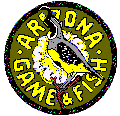

Coolers & Trash Mean Bear Buffets!
There are bears who find out fast that "cooler" means "let's eat" and
that "trash can" means "buffet." Those things can also mean death to the
bear.
Campers and homeowners often share the same habitat as bears. "Unfortunately, campers, homeowners and bears often share the same food - a fact that can mean death for a bear," reports Sue Trachy, Information Program Manager for the Department' Pinetop Office.
A bear's sense of smell can lead it to the remains of a sizzling
hotdog or tempting barbecued chicken from a mile away. "These animals are
smart, hungry, and strong. Their natural timidness of human beings is overcome
by the luscious scent of trash and leftovers."
Once a bear finds an
accessible trash can, the likelihood is it will eventually have to be destroyed
by Game and Fish wildlife managers. "The bear becomes an involuntary
participant in a tragic cycle of becoming accustomed to human food, returning
to human food sites, eventually losing its fear of humans, then actually
seeking out human food. At that point, a bear is no longer wild and timid. It
is a human safety hazard and must be destroyed," Trachey said.
Trachey explained that bears are just doing what comes naturally. Once a bear
tastes human food, it's just a matter of time before it comes back again.
"People start this cycle. It is up to people to break this cycle. The answer is
to manage our trash."
Due to dry winter conditions throughout most of
the state, bear-human conflicts in campgrounds and high country communities
during spring and summer is virtually guaranteed.
"We may not be able to predict what this summer's weather will provide, but we do know that even in the best of years, bears being attracted to campgrounds and communities is a fact of life. Bear awareness by those visiting and living in the high country is essential."
Wild Life Managers know that the only sure-fire way to keep a bear alive and wild is to make sure it never reaches a cooler or trash can in the first place. They are asking that the public help keep bears alive by following the simple precautions below:
While camping:
- Throw garbage in campground dumpsters as soon as possible. Campground hosts can soak rags in ammonia or bleach, place them inside the trash container, and mask most of the odors. If you are in a dispersed camping area without facilities, put your trash in a bag, tie it up with a rope, and raise it well above the ground (if you can stand on tip toes and touch the trash bag, it is too low);
- Bring your own rags and a bottle of ammonia or bleach on your camping trip. Some campgrounds don't have dumpsters or trash containers. Place a soaked rag over your trash, and put the trash away from your sleeping area;
- If possible, tie up your food between two trees, about eight or more feet off the ground;
- When going to bed, do not sleep in or even near the clothes you were wearing while cooking or eating meals. Likewise, keep all food away from your tent or sleeping quarters. Save your midnight snacks for home.
- Be sure to wash up, and make sure the youngsters wash up, before going to bed, especially if any of you have been eating desserts;
- Place food and coolers with food in the trunk of your vehicle - this could be an option for trash as well;
- Do not have toiletries, especially soap products near your sleeping area. Bears can be attracted, and often eat, pungent smelling soaps and lotions. Likewise, do not wear such lotions or perfumes camping.
At home:
- The single, most effective way to keep bears alive and wild is to keep trash in a closed building (garage, utility shed) until the morning of garbage pick-up day!!!
- If you must leave your trash out, soak rags in bleach or ammonia and place the rags on top of the garbage. Then put the lid on tight!
- Keep a clean bar-be-que!
- Keep pet food inside and feed your pet once a day. Don't leave pet food outside.
- If a bear has been spotted in your neighborhood, remove your hummingbird and suet feeders, and other "temptations" for a few days until the bear is gone.